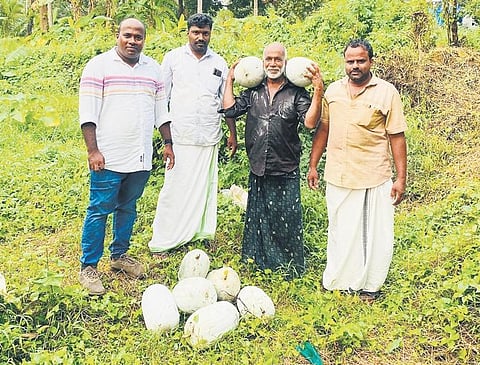

MALAPPURAM: Kodur, a small region in Malappuram, was once recognised as ‘Kumbalam Kodur.’ It got the moniker as large quantities of giant ash gourds -- kumbalam in Malayalam -- used to be cultivated in the area. They came to be known as ‘Kodur ash gourds’.
Each ash gourd harvested in the region weighed approximately 20kg and had a higher shelf life than the conventional varieties. Recognising the qualities of Kodur ash gourds, merchants from north India journeyed to Kodur to transport the distinctive agricultural produce in large trucks to their respective destinations. They primarily used Kodur ash gourds to make sweets like Agra Petha and Halwa.
The ash gourds also found their way to various parts of Kerala, including Kozhikode, Palakkad and Thrissur. Sadly, the cultivation of these unique ash gourds experienced a decline, and ended in 1980. Now it appears that Kodur is poised to reclaim its once-thriving agricultural heritage, as a local farmer, Abu, recently cultivated nine Kodur ash gourds after an approximate gap of 40 years.
Consequently, Kodur panchayat and Krishi Bhavan have decided to enhance the cultivation of Kodur ash gourds and find markets for these distinctive produce. “Kodur panchayat initiated the quest for Kodur ash gourd seeds after coming to power in 2020,” said Rabeeb K T, a panchayat member. The panchayat sought the cooperation of local farmers, urging them to provide Kodur ash gourd seeds, if available. “Unfortunately, the response was not favourable.
Recently, Abu approached us, revealing his successful cultivation of these colossal ash gourds. Subsequent examinations, cross-referenced with other farmers who cultivated this variety before 1980, confirmed that Abu’s ash gourds are indeed Kodur ash gourds. One of Abu’s ash gourds tipped the scales at an impressive 10.750 kg,” Rabeeb said. Abu said that he sourced the Kodur ash gourd seeds from his relatives. “With these seeds, we can grow ash gourds weighing up to 20 kg,” he said.
Attributing the earlier decline in Kodur ash gourd cultivation to the use of chemical fertilisers, Abu said, “Chemical fertilisers compromised the quality and longevity of Kodur ash gourds.” Local farmers pointed out that the diminishing quality led to north Indian merchants stopping the purchase of these ash gourds. Simultaneously, farmers in the area opted to migrate to Gulf countries, contributing to the waning cultivation of Kodur ash gourds.
Now, the agricultural department is diligently pursuing a Geographical Indication (GI) tag for Kodur ash gourds. “Our primary objective is to amplify Kodur ash gourd cultivation,” said Arshad N, the agricultural officer at Kodur Krishi Bhavan.
“We have obtained nine specimens cultivated by Abu, from which we will extract seeds to expand cultivation. Concurrently, we are exploring potential markets for these prodigious Kodur ash gourds. Collaborating with the Kerala Agricultural University, we will conduct a comprehensive study on the qualities of Kodur ash gourds. Post analysis, we intend to apply for the prestigious GI tag.”